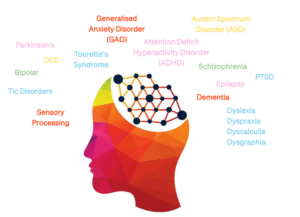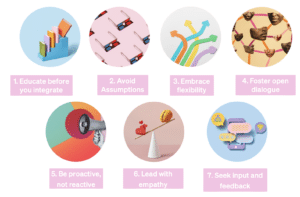Cultivating a neuro-inclusive workplace culture
In the intricate tapestry of human cognition, each brain is a unique masterpiece, much like a fingerprint. Neurodiversity, a term coined by Australian sociologist Judy Singer, celebrates the rich spectrum of thinking within the human species. It encompasses the myriad ways in which our brains work and interpret information, affecting sociability, learning, attention, mood, and other cognitive functions. Neuro-inclusion in the workplace is about cultivating a workplace environment that is adaptable, flexible, and supportive to enable all employees to do their best work.
During a recent Insight Series session exploring Neurodiversity in the workplace, only one-third of attendees revealed that their organisations have dedicated programs or initiatives to support neurodiverse employees in the workplace, emphasizing the critical need for greater understanding and the implementation of inclusive practices in the workplace.
This article summarises the insights from the session, and for those who would prefer a more visual and auditory learning experience, the 30-minute session recording can be viewed at any time here.
Understanding neurodiversity in the workplace
Definition, Importance, and the Spectrum of Neurodiversity
Neurodiversity refers to the diverse ways in which the brain works, acknowledging natural variations in thinking. It encompasses conditions such as ADHD, autism, anxiety, depression, dyslexia, and more.
As neurodiversity gains visibility, it’s essential to broaden our understanding beyond developmental disorders. The British Psychological Society’s Psychology at Work report highlights various neurodivergent conditions, emphasizing that neurodivergence does not require a cure but benefits from support and recognition.
Neurodivergent individuals can benefit from a little extra support and recognition, and taking a strengths-first approach to neurodiversity is critical. Understanding the various forms of neurodivergence, such as dyslexia, dyscalculia, Tourette syndrome, and mental health conditions, is integral to fostering an inclusive workplace. We all have more to gain if we open our minds to understanding these and thinking a little differently about how we can make work, work for our neurodivergent employees.
Neurodiversity statistics and the need for action
The statistics underscore the urgency of addressing neurodiversity in the workplace. Approximately 1 in 5 adults globally are neurodivergent, and a significant percentage face unemployment or discrimination. The gap between awareness and action is evident, with neurodiverse individuals reporting discrimination, harassment, and the need for workplace adjustments.
According to Deloitte’s 2019 Report ‘The social and economic costs of ADHD in Australia‘, reduced employment associated with ADHD was estimated to cost $3.09 billion in 2019. The National Study of Mental Health and Wellbeing in 2021-2022 revealed that 21.5% of people had a 12-month mental disorder, with anxiety being the most common group.
Diversity Council Australia’s Inclusion at Work index reported that discrimination and harassment for Neurodiverse employees in the workplace are common, with over a quarter of workers witnessing or experiencing discrimination and/or harassment. The gap between employer awareness and action is clear, indicating a need for businesses to be better equipped to support neurodiverse employees.
Common myths about neurodiversity
Dispelling myths is pivotal in creating an inclusive environment. Neurodivergent individuals bring unique strengths to the table, challenging preconceptions about intelligence, productivity, and leadership capabilities. Understanding and embracing neurodiversity not only aligns with ethical considerations but also contributes to business success. Common myths about neurodiversity in the workplace include:
- Neurodivergent Individuals Have Lower Intelligence
- Neurodivergent People Are Less Productive
- Neurodiversity Is Just a New Trend or Buzzword
- Hiring Neurodivergent Individuals is Costly and Time-Consuming
- Neurodivergent People are More Likely to Have Behavioural Problems at Work/Lack Social Skills and Can’t Work in Teams
- Neurodivergent Individuals Do Not Make Good Leaders
Addressing these misconceptions is vital for fostering a workplace culture that appreciates and leverages the unique abilities of neurodivergent individuals.
Neurodiversity as a competitive advantage
As societal awareness grows, businesses recognising and harnessing neurodiversity are positioned not just for compliance but for a competitive edge in recruiting, creativity, and overall organisational performance.
Neuro-inclusion is an active commitment to creating an environment where neurodivergent individuals are not just recognised but actively included. Practical steps, such as leadership advocacy, inclusive hiring, creating support networks, and ensuring universal design in workplace practices (accommodations available to all in the organisation), facilitate this transition from awareness to active inclusion.
Neurodiversity characteristics and workplace challenges
Understanding the characteristics and challenges faced by neurodivergent individuals is foundational to creating an inclusive workplace. Some of the key characteristics and challenges for neurodivergent employees include:
- Sensory Overload
- Social Interaction
- Organisational Skills
- Routine Changes
- Executive Functioning
- Workplace Culture
- Physical Workspace
- Misunderstanding
- Performance Evaluation
- Accommodations
Each person brings their brain to work every day, and recognising the common experiences of neurodivergent individuals is critical. Addressing these challenges requires a nuanced approach, involving training for managers and fostering an understanding of neurodiversity across all levels.
Reasonable accommodations and inclusive practices
Getting a diverse group of people to work effectively together requires inclusivity. Neuro-inclusion starts with people and extends to processes, ensuring that various barriers are dismantled, and neurodivergent talent can secure and advance in their careers.
Creating a neuro-inclusive workplace involves implementing reasonable accommodations and inclusive practices to ensure that neurodivergent individuals can thrive in their professional environments. Examples of reasonable accommodations and inclusive practices include:
- Flexible Scheduling
- Workspace Adjustments
- Clear Communication
- Structured Support
- Training for Staff
- Assistive Technology
- Modified Performance Evaluations
Seven tips to build a neuro-inclusive workplace
Building a neuro-inclusive workplace demands a proactive and empathetic approach. Educating leaders and employees, avoiding assumptions, embracing flexibility, fostering open dialogue, being proactive, leading with empathy, and seeking input and feedback are essential tips.
- Educate Before You Integrate: Ensure that leaders and employees understand neurodiversity.
- Avoid Assumptions: Treat each neurodivergent employee as an individual with unique strengths and needs.
- Embrace Flexibility: Standard practices might not suit all; be open to personalised approaches.
- Foster Open Dialogue: Encourage honest and respectful communication about needs and preferences.
- Be Proactive, Not Reactive: Don’t wait for issues to arise; anticipate needs and address them early.
- Lead with Empathy: Understand that some workplace norms can be challenging for neurodivergent individuals.
- Seek Input and Feedback: Regularly consult with neurodivergent employees on how to improve policies and practices.
By taking these steps, organisations can not only enhance the safety and well-being of neurodivergent employees but also improve overall business performance, foster a more inclusive culture, and strengthen team dynamics.
Nurturing a neuro-inclusive culture for ongoing success
Fostering a neuro-inclusive organisation and developing the necessary mindset is an ongoing process, not a one-time initiative
As organisations strive for excellence and innovation, tapping into the unique perspectives and strengths of neurodivergent individuals is a pathway to success. By adopting inclusive practices, dispelling myths, and actively promoting neuro-inclusion, businesses can create environments where every individual, regardless of neurodivergence, can thrive and contribute meaningfully.
At Inkling, we’re supporting our clients to build neuro-inclusive workplace cultures where everyone can thrive through our strategic D&I advisory services and learning initiatives.



